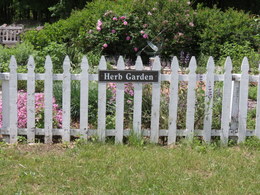Herb Garden Growing Guide
An herb garden was very important in the past because they had so many uses. Some of these were medicinal, culinary, fragrance, pest repellent and dyes. Even today they will be a useful addition to any home.
It is very common to have a small herb garden just a few steps from the kitchen, so that when cooking or making a salad, all it takes is a quick dash to go out and get some. Many herbs do very well when grown in containers and are very popular if you live in a condominium or apartment with a patio, deck or balcony.
Most herbs prefer full sun of at least 6 hours per day. If you have an area that gets some light dappled shade this is where you can plant chives, cilantro, dill, mint and parsley.
Remember that if you plant perennial herbs in the vegetable garden, keep those in a separate section, so you'll be sure to avoid damaging them when preparing your garden in the spring.
Annual Herbs
Annual herbs have a growing life cycle that begins after the last frost in the spring and usually die in the fall. Popular annual herbs are: basil, cilantro/coriander, dill, garlic, onions and parsley.
Perennial Herbs
If you are thinking about planting some perennial herbs in you vegetable garden, you should set aside a separate herb garden area for them, since these herbs will be there for many years.
Some perennial herbs are: chives, fennel, ginger, horseradish, marjoram, mint, oregano, rosemary, sage, tarragon and thyme.
Not all perennial herbs are hardy in the colder USDA zones, so check your herb to see if it is hardy in your zone. If your herb is not hardy in your zone, you can grow the herb as an annual. Many herbs can be dug up and potted to bring indoors for the winter.
If you have a cat you should plant some catnip and catmint.
Mix it Up
It is very common to plant some herbs along with flowers. Purple sage will add some interesting color. Any place you have an empty spot try putting in some basil, parsley, oregano, rosemary, sage, tarragon or thyme. These will add some interesting foliage as well as aroma to your flower garden.
Do not be surprised if visitors to your home, who admire your flowers, ask you what that interesting looking plant is.
Herb Garden Location
You need only a few plants of each herb for your family. A small group of herbs can be planted in front of taller plants so that the herbs are in the full sun and not the shade.
If you have a rock garden, a small herb garden mixed in would be an ideal addition. Most herbs prefer the full sun, but some will do well in locations with part sun. Make herbs a part of your edible landscaping.
Containers
Most herbs will do very well growing in containers. Choose the ones you and your family like the best. You only use a little bit of the herb each time you cook. The amount you take is like pruning and will encourage the herb to grow even more.
The most common herbs for containers are: basil, chives, cilantro, oregano, parsley, rosemary, sage and thyme. You only need one or perhaps two of your favorite herb for your container garden.
Some herbs, especially parsley, are a bit hard to germinate and grow, so often the easiest way is to buy them in the garden center in the spring. Watering with lukewarm water and using a seed starting heat mat will increase the germination rate.
For more detailed information visit the seed starting page.
Some herbs can be purchased one to a pot while others will have several in a pot that you can separate and repot. You can always trade extra herbs with your friends or your local garden club.
You can plant several herbs in a large pot or a window box using a good potting soil. Do not plant them too close together and make sure that they get enough sunlight. Keep the soil moist, but not too wet and soon you will be harvesting your own herbs for your family. Make sure that your herbs get 6-hours of sun each day.
Sources: Gardener’s Supply Company, Garden Patch.
Garden Spikes newsletters give you timely information once or twice a month. Subscribe Free to the Garden Times newsletter below.
Your email address will only be used to send you a newsletter and will never be sold. You can unsubscribe at any time.

